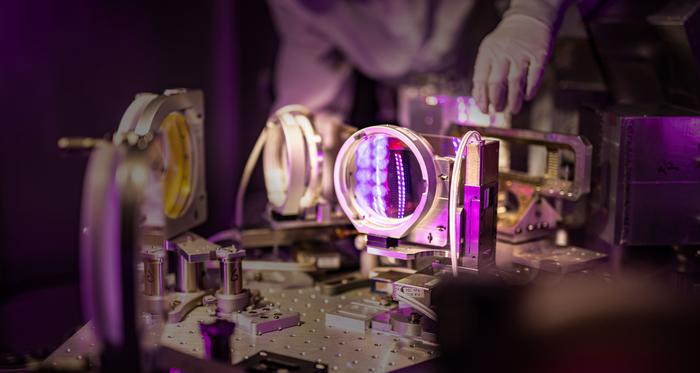Research and technology development for plasma physics and fusion energy at the Department of Energy’s SLAC National Accelerator Laboratory just got a boost from a LaserNetUS award.

Credit: Jacqueline Ramseyer Orrell/SLAC National Accelerator Laboratory
Research and technology development for plasma physics and fusion energy at the Department of Energy’s SLAC National Accelerator Laboratory just got a boost from a LaserNetUS award.
In total, the DOE’s Office of Science awarded $28.5 million to advance discovery science and inertial fusion energy, including a three-year grant for the development and operations of the Matter in Extreme Conditions (MEC) instrument at SLAC’s Linac Coherent Light Source (LCLS).
MEC has been home to high intensity laser experiments since 2012, and joined the LaserNetUS network as a founding member in 2018. The new DOE funding puts an additional focus on building the science and technologies needed to develop inertial fusion energy.
Last year’s breakthrough at the National Ignition Facility brought into view the potential of inertial fusion energy, in which a net source of power can be created by heating and compressing pellets of fuel with powerful lasers. Since then, scientists in the field came together to identify the most important basic research needs for realizing this potential future energy source, according to Gilliss Dyer, MEC department head and lead scientist. The DOE Office of Science workshop resulted in the IFE Basic Research Needs Report on the topic.
“For the first time, MEC will emphasize inertial fusion energy priority research through development of capabilities and configurations, outreach through LaserNetUS, and the allocation of dedicated facility access for such research,” Dyer said. “The goal is to deliver up to 50% of MEC’s beam time for experiments relevant to inertial fusion energy.”
The activities of the network at MEC and other facilities will also help lay the groundwork for a major upgrade to MEC, Dyer said, by developing a new generation of diagnostics for hotter, denser plasmas.
Beyond inertial fusion energy science, high-intensity lasers have a broad range of applications in basic research, manufacturing and medicine. For example, they can be used to generate high energy particle beams for cancer therapy and to detect trace elements in the environment. SLAC’s MEC instrument has also enabled unique studies of extremely hot, dense matter found at the centers of stars and giant planets. The instrument’s optical lasers – one used to study hot, dynamic plasma and another to drive shockwaves in materials to study high pressures – combined with the world-leading X-ray laser beam of LCLS have produced numerous scientific results published in major journals.
LaserNetUS was established by the Fusion Energy Sciences program of the DOE’s Office of Science. It provides researchers from the U.S. and abroad open and free access to the most powerful lasers at universities and national laboratories throughout the U.S. and Canada. The network currently has more than 1,200 members. LaserNetUS management was centralized at SLAC in 2021 by appointing SLAC scientist Chandra Breanne Curry to be the consortium’s first coordinator.




